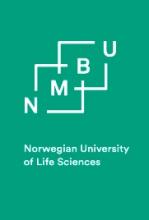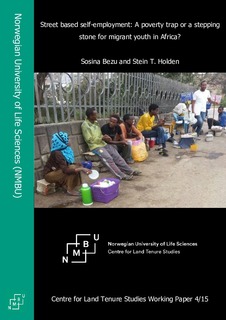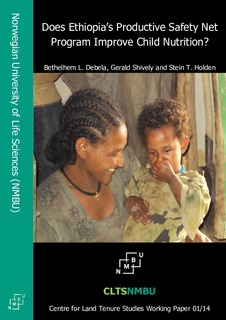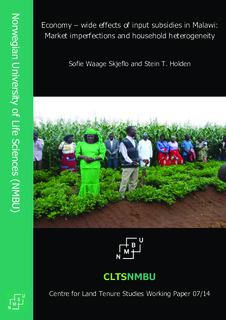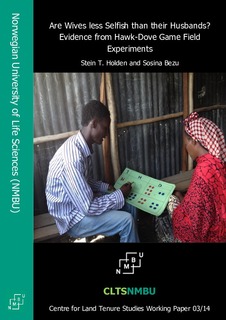Location
NMBU's mission is to contribute to the well-being of the planet. Our interdisciplinary research generates innovations in food, health, environmental protection, climate and sustainable use of natural resources.
About NMBU
NMBU's research is enabling people all over the world to tackle the big, global challenges regarding the environment, sustainable development, how to improve human and animal health, renewable energy sources, food production, and land- and resource management.
Members:
Resources
Displaying 41 - 45 of 98Street based self-employment : a poverty trap or a stepping stone for migrant youth in Africa?
A significant percentage of youth in urban Africa is employed in the informal sector. The
informal sector is more accessible than the formal sector for people with low human and
financial capital, such as youth migrants from rural areas. But the sector is also generally
Alliances for Religions and Conservations (ARC) “Faith Engagement in Climate Smart Agriculture and Sustainable Land Management in Kenya, Tanzania and Uganda
This is a desk appraisal of the Alliances for Religions and Conservations (ARC) done for the Norwegian Agency for Development Cooperation (Norad) by the Department of International Environment and Development Studies, Noragric, at the Norwegian University of Life Sciences (NMBU).
Does Ethiopia's productive safety net program improve child nutrition?
We study the link between Ethiopia’s Productive Safety Net Program (PSNP) and short-run nutrition outcomes among children age 5 years and younger. We use 2006 and 2010 survey data from Northern Ethiopia to estimate parameters of an exogenous switching regression. This allows us to measure the differential impacts of household characteristics on weight-for-height Z-score of children in member and non-member households in PSNP. We find that the magnitude and significance of household covariates differ in samples of children from PSNP and non-PSNP households.
Economy-wide effects of input subsidies in Malawi : market imperfections and household heterogeneity
The potential benefits of providing subsidized inputs to farm-households in developing countries may reach well beyond the targeted households. More specifically, increased food productionand demand for rural labor may benefit poor households through lower food prices and higherrural wages. However, two recent studies of a large input subsidy program in Malawi find thatthese effects are smaller than expected based on anecdotal evidence and previous studies usingsimulation models.
Are wives less selfish than their husbands? Evidence from Hawk-Dove game field experiments
Lab-in-the-field Hawk-Dove game experiments were played by spouses in a rural sample of households in Southern Ethiopia where women/wives traditionally have a weak position. Randomized treatments included a 3x3 design with simultaneous, one-way signaling and sequential games as the first dimension and Pareto-efficient, Pareto-inferior and Pareto-superior (Dove;Dove) payout treatments as the second dimension, with a sequence of six game rounds per household.

